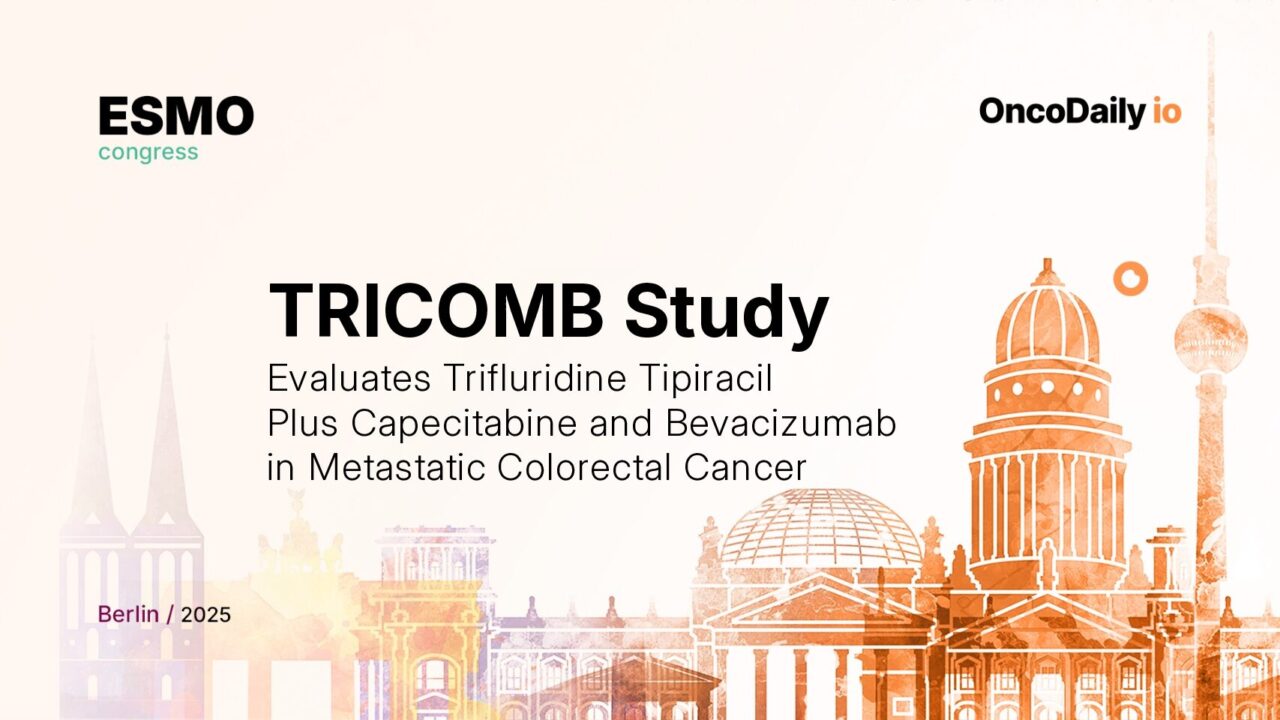Clinical trial ID: NCT04564898
Presenter: Paolo Ciracì, MD (Pisa, Italy)
Collaborating investigators: Veronica Conca, Roberto Moretto, Francesca Bergamo, Filippo Pietrantonio, Sara Lonardi, Alberto Zaniboni, Vittorio Studiale, Luca Esposito, Alessandra Russo, Giovanni Trovato, Maria Laura Iaia, Matteo B. Landi, Lorenzo Antonuzzo, Mariaelena Casagrande, Stefano Tamberi, Sabina Murgioni, Alessandro Cappetta, Daniele Rossini, Chiara Cremolini.
Funding: GONO Foundation and Servier.
For approximately 15–20% of patients with unresectable metastatic colorectal cancer (mCRC), combination chemotherapy regimens such as FOLFOX or FOLFIRI are unsuitable due to age, comorbidities, or poor performance status. In this population, the standard first-line therapy remains capecitabine (CAP) plus bevacizumab (BEV).
Preclinical studies, however, have suggested synergistic antitumor activity between capecitabine and trifluridine/tipiracil (FTD/TPI) when used sequentially, due to complementary mechanisms of thymidylate synthase inhibition and DNA incorporation. Based on these findings, the GONO Foundation initiated the TRICOMB study, evaluating a novel sequential combination of CAP + FTD/TPI + BEV as an upfront therapy for patients ineligible for intensive chemotherapy. The phase I portion defined the recommended dose of FTD/TPI, and the phase II analysis—presented here—reports preliminary efficacy and safety data.
Methods
The phase II TRICOMB study (NCT04564898) enrolled previously untreated mCRC patients who were ineligible for intensive regimens, across 11 Italian centers.
Treatment schedule (28-day cycles):
- Capecitabine (CAP) – 1000 mg/m² orally twice daily, days 1–14
- Trifluridine/tipiracil (FTD/TPI) – 25 mg/m² orally twice daily, days 15–19 and 22–26
- Bevacizumab (BEV) – 5 mg/kg IV on days 1 and 15
Treatment was continued until disease progression or unacceptable toxicity.
The primary endpoint was objective response rate (ORR) per RECIST v1.1. The design assumed a null hypothesis ORR of 25% and an alternative hypothesis of 45%, requiring at least 14 responses among 36 patients to consider the regimen promising (α = 0.05, β = 0.20).
Results
Between January 2022 and August 2024, 38 patients were enrolled, including 6 from the phase I cohort treated at the recommended dose.
Baseline characteristics:
- Median age: 80 years
- Female: 63%
- ECOG PS > 0: 55%
- Synchronous metastases: 61%
- Liver-only disease: 24%
- Left-sided primary: 50%
- RAS-mutant: 82%
- pMMR (microsatellite stable): 100%
Efficacy outcomes:
- Partial responses: 20 patients
- Objective response rate (ORR): 52.6% (90% CI 38–67%)
- Disease control rate (DCR): 84%
- Median progression-free survival (PFS): 10.3 months (95% CI 7.7–14.2)
- Median follow-up: 11.6 months
- Progressions: 24 of 38 patients (63%)
- Subsequent therapy: 58% of patients received ≥1 post-progression line
- Overall survival (OS): data immature
Safety profile:
Grade 3/4 adverse events were consistent with expectations for the component agents:
- Neutropenia: 38%
- Anemia: 38%
- Thromboembolic events: 16%
- Asthenia (fatigue): 11%
- Febrile neutropenia: 5%
- Diarrhea: 5%
No new safety signals were observed, and toxicities were manageable with standard supportive care.

Conclusions
The TRICOMB phase II study met its primary endpoint, demonstrating an objective response rate exceeding 50%—substantially higher than the historical benchmark for CAP + BEV alone in frail or elderly mCRC patients.
The sequential CAP → FTD/TPI + BEV regimen yielded encouraging disease control and progression-free survival (~10 months) with an acceptable safety profile, even in a cohort with a median age of 80 years.
These findings support further investigation of the TRICOMB regimen as a novel, low-intensity, front-line therapeutic option for patients with metastatic colorectal cancer who are unsuitable for standard doublet chemotherapy.
You can read the full abstract here


